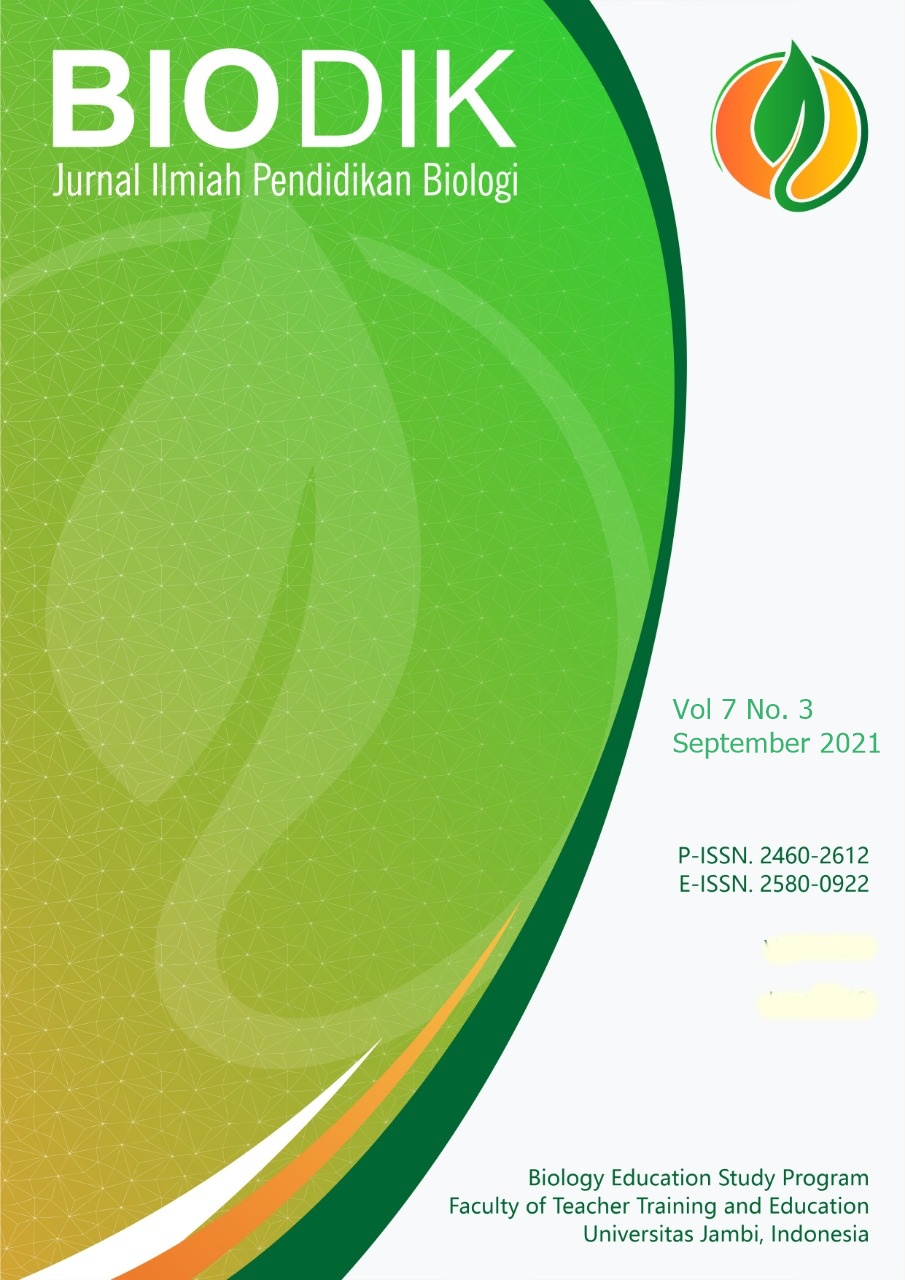Pengaruh Pendekatan Inkuiri-Kontekstual Berbasis Teknologi Informasi Terhadap Keterampilan Proses Sains Peserta Didik SMA Pada Konsep Ekosistem
(The Effect of Inquiry-Contextual Approach Based on Information Technology on The Science Process Skills of High School Students on The Ecosystem Concept)
DOI:
https://doi.org/10.22437/bio.v7i3.13430Abstract
This study aims to determine the effect of the inquiry-contextual approach on the science process skills of high school students in learning ecosystem materials using information technology media, namely google form, google meeting, google classroom and whatsapp group. This research method is a pre-experiment with the type of One Group Pretest-Posttest Design. The multiple choice questions consist of ten indicators of science process skills, each of wich contains one questions. The sampling technique was Simple Random Sampling from the population of SMA Negeri 2 Sukabumi City. The result showed that the inquiry-contextual approach had an influence in training students science process skills. It is proven in the acquisition of n-gain scores, per-indicator percentage values, gender dominance in answering correctly and the result of LKPD scores.
Abstrak. Penelitian ini bertujuan untuk mengetahui pengaruh pendekatan inkuiri-kontekstual terhadap keterampilan proses sains peserta didik sekolah menengah atas pada pembelajaran materi ekosistem dengan menggunakan media teknologi informasi yaitu google form, google meeting,google classroom dan whatsapp group. Metode penelitian ini berupa pra-eksperimen dengan jenis One Group Pretest-Posttest Design. Soal pilihan ganda berjumlah sepuluh indikator keterampilan proses sains dimana masing-masing memuat satu soal. Teknik pengambilan sampel berupa Simple Random Sampling dari populasi SMA Negeri 2 Kota Sukabumi. Hasil penelitian menunjukan bahwa pendekatan inkuiri-kontekstual memiliki pengaruh dalam melatih keterampilan proses sains peserta didik. Dibuktikan dalam perolehan skor n-gain, nilai persentase per-indikator, dominasi gender menjawab benar dan hasil nilai LKPD.
Downloads
References
Agustina, P., & Saputra, A. (2016). Prosiding Seminar Nasional Pendidikan Sains (SNPS).
Arikunto. (2013). Prosedur Penelitian: Suatu Pendekatan Praktik. PT. RINEKA CIPTA.
Asmani, J. M. (2011). Tips efektif pemanfaatan teknologi informasi dan komunikasi dalam dunia pendidikan | Perpustakaan Kementerian Pendidikan dan Kebudayaan. perpustakaan kemendikbud.
Dimyati. (1999). Belajar dan pembelajaran. rineka cipta.
Glackin, M., & Harrison, C. (2018). Budding biology teachers: what have botanical gardens got to offer inquiry learning. Journal of Biological Education, 52(3), 283–293. https://doi.org/10.1080/00219266.2017.1357648
Hadisi, L., & Muna, W. (2015). Pengelolaan Teknologi Informasi Dalam Menciptakan Model Inovasi Pembelajaran (E-Learning ). Jurnal Al-Ta’dib, 8(1), 117–140.
Haka, N. B., Pratiwi, V. D., Anggoro, B. S., & Hamid, A. (2020). Analisis Keterampilan Proses Sains Dan Self Regulation Biologi Kelas XI : Pengaruh Model Auditory, Intellectually dan Repatition (AUDI-IR). Journal Of Biology Education, 3(1), 16. https://doi.org/10.21043/jobe.v3i1.6922
Hake, R. R. (1998). Interactive-engagement versus traditional methods: A six-thousand-student survey of mechanics test data for introductory physics courses. American Journal of Physics, 66(1), 64–74. https://doi.org/10.1119/1.18809
Isjoni. (2008). Model-Model Pembelajaran Mutakhir: Perpaduan Indonesia-Malaysia (cetakan 1). pustaka pelajar, yogyakarta.
Komalasari, K. (2017). Pembelajaran Kontekstual (cetakan 5). refika adiatama.
Murniasih, L., Subagia, I. W., & Nyoman Sudria, I. B. (2013). PENGELOLAAN PEMBELAJARAN IPA: STUDI KASUS PADA SMP DI DAERAH TERDEPAN, TERLUAR, DAN TERTINGGAL (Vol. 4).
Rahayu, A. H., Anggraeni, P., Studi, P., Guru, P., Dasar, S., Sebelas, S., Sumedang, A., Program, ), & Guru, S. P. (2017). ANALISIS PROFIL KETERAMPILAN PROSES SAINS SISWA SEKOLAH DASAR DI KABUPATEN SUMEDANG. Pendidikan Guru Sekolah Dasar (PGSD) Universitas Syiah Kuala JURNAL PESONA DASAR, 5(2), 22–33.
Rusman. (2010). Model-model Pembelajaran. raja grafindo persada.
Rusydi, I. (2019). Peranan Perkembangan Teknologi. Journal of Chemical Information and Modeling, 53(9), 1689–1699.
Subali, B. (2013). Kemampuan Berpikir Pola Divergen dan Berpikir Kreatif dalam Keterampilan Proses Sains. UNY PRESS.
Sudijono, A. (1996). Pengantar evaluasi pendidikan. raja grafindo persada.
Sugiyono. (2001). metode penelitian. cv.alfa beta.
Sumiati. (2009). metode pembelajaran. cv. wacana prima.
Sund, R. dan T. (1973). Teaching Science by Inquiry in The Secondary School. Bell and Howell Company.
Suryosubroto. (2002). proses belajar mengajar di sekolah. rineka cipta.
Tawil, M. (2014). Keterampilan-Keterampilan Sains dan Implementasinya dalam Pembelajaran IPA. badan penerbit UNM.
Downloads
Published
How to Cite
Issue
Section
License
Copyright (c) 2021 Zulfah Puspita, Aa Juhanda, Sistiana Windyariani

This work is licensed under a Creative Commons Attribution-NonCommercial-ShareAlike 4.0 International License.
Copyright Notice
Authors who publish with Biodik : Jurnal Ilmiah Pendidikan Biologi agree to the following terms:
- For all articles published in Biodik : Jurnal Ilmiah Pendidikan Biologi, copyright is retained by the authors and grant the journal right of first publication with the work simultaneously licensed under a Creative Commons Attribution-ShareAlike 4.0 International Licensethat allows others to share the work with an acknowledgment of the work's authorship and initial publication in this journal.
- Authors are able to enter into separate, additional contractual arrangements for the non-exclusive distribution of the journal's published version of the work (e.g., post it to an institutional repository or publish it in a book), with an acknowledgment of its initial publication in this journal.
- Authors are permitted and encouraged to post their work online (e.g., in institutional repositories or on their website) prior to and during the submission process, as it can lead to productive exchanges, as well as earlier and greater citation of published work (See The Effect of Open Access).
















